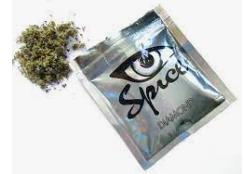Even a blind mayor finds a good law every now and then. Earlier this year, New York Mayor Bill de Blasio picked up where his predecessor, former chief executive nanny Michael Bloomberg, left off trying to severely restrict the city's consumption of salt, when instead he should have been more worried about spreading it on the streets after a snowstorm. "There is absolutely no solid evidence," said Dr. Lila Abassi, Director of Medicine at the American Council of Science of Health, "that reducing salt intake in healthy adults or children provides any cardiovascular benefits whatsoever." While it's fine and dandy that de Blasio has gotten around to criminalizing something that is actually dangerous K2, aka "synthetic marijuana" the effect will be short-lived. It is only a matter of how short. We can thank synthetic organic chemistry for this. First, it should be made clear that the term synthetic marijuana is both incorrect and misleading. It implies that the chemical is a synthetic equivalent of marijuana (false), that it has the same pharmacological effects as marijuana (also false), and that it has anything resembling the safety profile of marijuana (really false). Yet, it is this phony name that gets people who take the drug in trouble, something I previously discussed in a piece called "About Face (Chewing)." K2 has a number of other names, such as Spice, Skunk and Fake Weed. And, making matters far more confusing, it isn't even one chemical, rather, a mixture of several psychoactive chemicals that are added to some ground up inert plant. The type of plant is irrelevant, since its function is to fill up the package and give a vehicle to which the drug can be added. According to the National Institute on Drug Abuse, a division of the NIH: "Labels on Spice products often claim that they contain 'natural' psychoactive material taken from a variety of plants. Spice products do contain dried plant material, but chemical analyses show that their active ingredients are synthetic (or designer) cannabinoid compounds." The only truth to the name "synthetic marijuana" is that some of the chemicals in it bind to the same receptors as THC the psychoactive chemical in pot. But some of the synthetics bind much better, and this is responsible for many dangerous physiological effects, such as extreme anxiety, paranoia, convulsions, vomiting, hallucinations, disorientation and dangerously elevated heart rates and blood pressure. It is the complex, and often unknown mixture of drugs, that makes regulation of these "herbal" drugs so tricky. The DEA has identified five of the most commonly found chemicals in K2/Spice, and they are classified as Schedule I drugs not approved for any human use. And they are now illegal. This won't last. Getting around the law is child's play. Any or all of the five psychoactive chemicals that give K2 its properties could be tweaked, creating new drugs that are not yet illegal, but will still act in the brain. Even a moderately competent organic chemist can do this in his sleep. So, banning K2 is the right move, but it is only a stopgap measure. Before long, "K3" will be made and initially be legal, and this unwinnable battle will continue.
Outlawing K2 Drug is Right, But Ultimately Ineffective
New York City has criminalized K2, or "synthetic marijuana." While this is the right thing to do, the effect will be short-lived since five psychoactive chemicals that give the dangerous street drug its properties can, and eventually will, be easily tweaked to skirt the law.




